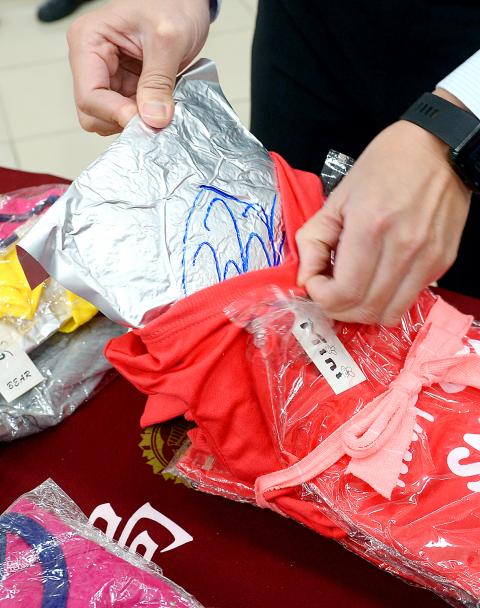Keelung authorities last month confiscated 600kg of MDMA, the largest amount in the nation’s history, the Ministry of Justice Investigation Bureau said yesterday.
The haul of MDMA, which is commonly known as ecstasy, has a blackmarket value of NT$3 billion (US$102.24 million) and amounts to 23 million doses, officials said.
The bureau announced the bust at a news conference attended by bureau Director-General Tsai Ching-hsiang (蔡清祥), Deputy Minister of Justice Tsai Pi-chung (蔡碧仲) and Keelung District Prosecutors’ Office chief prosecutor Chen Hung-ta (陳宏達).

Photo: Lin Cheng-kung, Taipei Times
In December last year, the bureau’s Taipei office received intelligence that smugglers were moving a large quantity of drugs from China in anticipation of increased demand at night clubs over the Lunar New Year period, officials said.
The Keelung District Prosecutors’ Office was notified and it opened an inquiry, with the bureau leading the multiagency task force, which also involved the Customs Administration, officials said.
After reviewing tens of thousands of import documents, investigators zeroed in on several shipping containers stored in facilities in Taipei, which they inspected on Jan. 15, officials said.
With the aide of sniffer dogs, investigators discovered 977 bags in three shipping containers, inside boxes that had been listed as containing clothing on import documents, officials said.
Laboratory tests confirmed the bags contained MDMA, they said.
After surveiling suspects, bureau agents in Taichung on Monday arrested a man surnamed Chen (陳), who is the registered owner of the shipment, officials said.
Chen is to be held in pretrial detention while investigations continue, they added.
The bust was the latest in a series of investigations that have uncovered large quantities of narcotics, including the discovery of a drug lab in Taipei’s Nangang District (南港) in October last year; a smuggling operation involving 14kg of heroin from Taichung in November; and the discovery of a ketamine lab in Taichung in December.

Alain Robert, known as the "French Spider-Man," praised Alex Honnold as exceptionally well-prepared after the US climber completed a free solo ascent of Taipei 101 yesterday. Robert said Honnold's ascent of the 508m-tall skyscraper in just more than one-and-a-half hours without using safety ropes or equipment was a remarkable achievement. "This is my life," he said in an interview conducted in French, adding that he liked the feeling of being "on the edge of danger." The 63-year-old Frenchman climbed Taipei 101 using ropes in December 2004, taking about four hours to reach the top. On a one-to-10 scale of difficulty, Robert said Taipei 101

A preclearance service to facilitate entry for people traveling to select airports in Japan would be available from Thursday next week to Feb. 25 at Taiwan Taoyuan International Airport, Taoyuan International Airport Corp (TIAC) said on Tuesday. The service was first made available to Taiwanese travelers throughout the winter vacation of 2024 and during the Lunar New Year holiday. In addition to flights to the Japanese cities of Hakodate, Asahikawa, Akita, Sendai, Niigata, Okayama, Takamatsu, Kumamoto and Kagoshima, the service would be available to travelers to Kobe and Oita. The service can be accessed by passengers of 15 flight routes operated by

Taiwanese and US defense groups are collaborating to introduce deployable, semi-autonomous manufacturing systems for drones and components in a boost to the nation’s supply chain resilience. Taiwan’s G-Tech Optroelectronics Corp subsidiary GTOC and the US’ Aerkomm Inc on Friday announced an agreement with fellow US-based Firestorm Lab to adopt the latter’s xCell, a technology featuring 3D printers fitted in 6.1m container units. The systems enable aerial platforms and parts to be produced in high volumes from dispersed nodes capable of rapid redeployment, to minimize the risk of enemy strikes and to meet field requirements, they said. Firestorm chief technology officer Ian Muceus said

MORE FALL: An investigation into one of Xi’s key cronies, part of a broader ‘anti-corruption’ drive, indicates that he might have a deep distrust in the military, an expert said China’s latest military purge underscores systemic risks in its shift from collective leadership to sole rule under Chinese President Xi Jinping (習近平), and could disrupt its chain of command and military capabilities, a national security official said yesterday. If decisionmaking within the Chinese Communist Party has become “irrational” under one-man rule, the Taiwan Strait and the regional situation must be approached with extreme caution, given unforeseen risks, they added. The anonymous official made the remarks as China’s Central Military Commission Vice Chairman Zhang Youxia (張又俠) and Joint Staff Department Chief of Staff Liu Zhenli (劉振立) were reportedly being investigated for suspected “serious